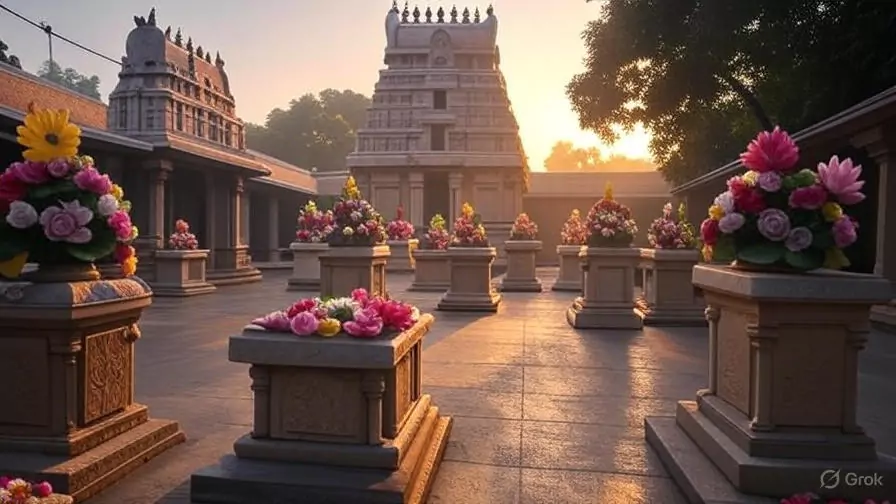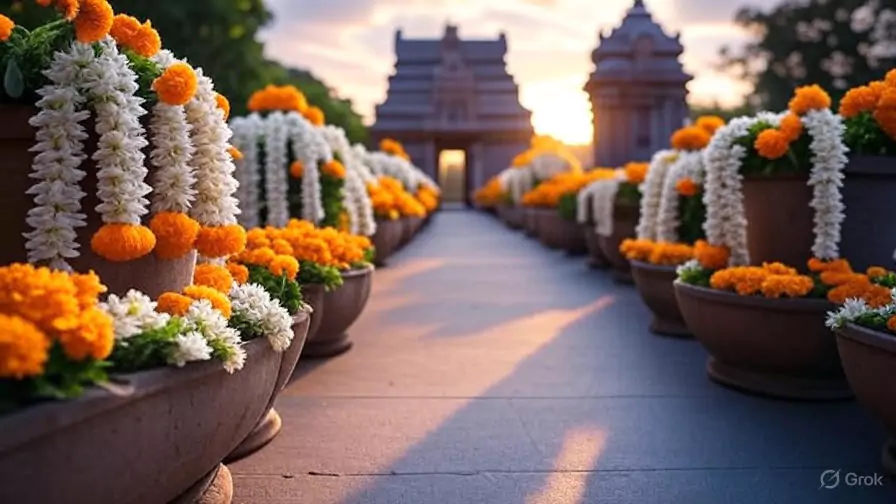- June 8, 2025

Visiting temples can be a deeply fulfilling spiritual experience if you follow certain guidelines. Here are some practical tips to make your temple visits meaningful and hassle-free:
At Gunaseelam Temple, flowers or garlands brought from outside are not offered to the deity. Only flowers from the temple’s garden are used. If you wish to offer a garland, you can pay at the temple office, and it will be offered in your name on a chosen day. Similarly, kumkum prasadam must be purchased from the temple. Despite signboards at the entrance stating that outside flowers are not accepted, vendors may insist on selling them, claiming they’ll be allowed. However, these flowers won’t be used and are often discarded. Be cautious to avoid disappointment.
In Nanganallur’s Anjaneyar and Lakshmi Narasimhar Temples, garlands strung with thread are not accepted; only those made with natural fiber are permitted. Powdered rock sugar is not used—only large rock sugar sold at the temple counter is offered. Items brought in plastic baskets or covers are also not accepted. Ensure you follow these rules to avoid rejection of your offerings.
At Tiruchanur’s Padmavathi Temple, garlands sold outside with lilies and a single rose inserted are not offered to the deity. Only fragrant flowers like jasmine, rose, champaka, sampangi, or lotus are used. Garlands with dried grass or mandara leaves are not accepted in Perumal temples, so check carefully when purchasing to avoid disappointment.
At Kalahasti Temple, vendors at the entrance may sell “Navagraha remedial plates,” but these are not accepted inside, as indicated by signboards. Purchase remedial items and tickets only from the temple counter. If you buy from outside agents, you may be asked to sit at a distance and observe the rituals. Additionally, priests may request dakshina after the puja, so keep small denominations handy.
In Perumal temples, hibiscus and nandiyavartham flowers are not offered. These are suitable for Shiva or Amman temples. For Perumal, bring tulsi leaves or garlands. Ghee lamps are typically lit in Perumal temples, so carry ghee, while sesame oil is appropriate for Shiva temples.

At Sriperumbudur, coconuts are not broken on Thiruvathirai days, as Ramanujar is considered a child on his birth star day, and the sound is believed to disturb him.
For lesser-known ancient temples, avoid carrying expensive items like almonds or cashews. Instead, bring rice or lamp oil. Rather than buying wilted flowers or fruits sold at the entrance, plan ahead and bring fresh garlands and fruits. If traveling by car, allocate space for these items. Offering contributions to priests in ancient temples is a thoughtful gesture, as they rely on such support.
Carry small envelopes or paper to store vibhuti and kumkum received at temples. Leftover prasadam can be dissolved in water and poured at the base of plants at home.
Avoid using disposable bottles for receiving theertham. Carry a small silver or brass tumbler or container. Minimize plastic use to respect temple traditions.
Use brass, wooden, or bamboo trays to carry puja items instead of plastic bags. In earlier times, households had silver or brass baskets for this purpose—consider reviving this eco-friendly practice.
By following these guidelines, your temple visits will be spiritually enriching and seamless. Plan thoughtfully and embark on your journey with devotion!